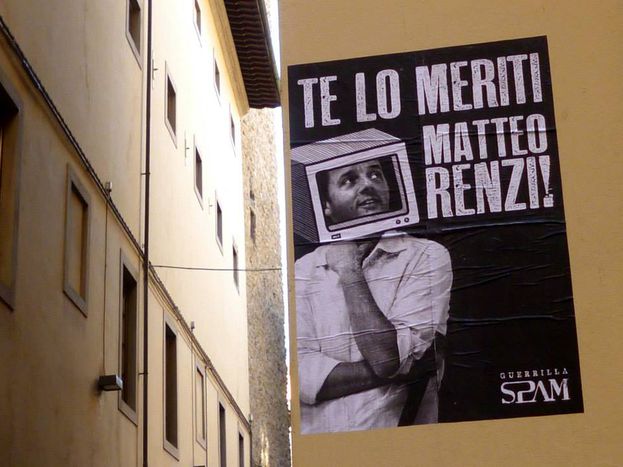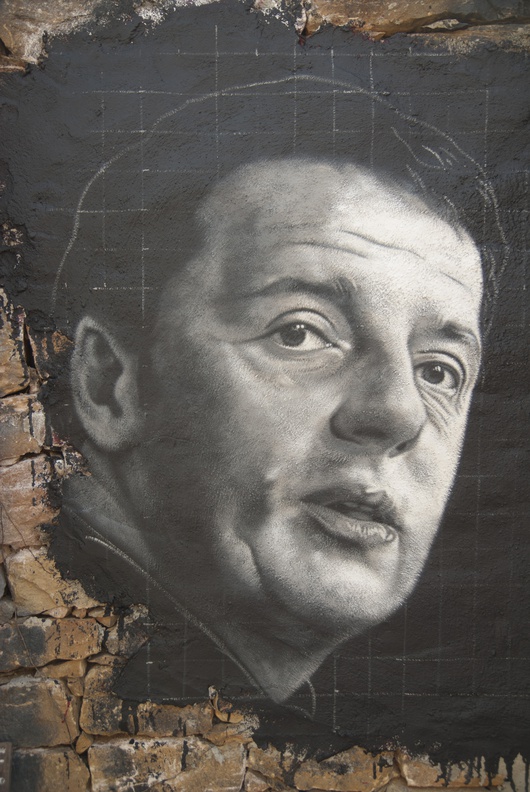
Europe of Renzi: From Selfies to Google Maps
Published on
Translation by:
Kait BolongaroMatteo Renzi's speech in Strasbourg signals a turning point in politics. Like it or not, a new way of communicating (and doing) politics, a neo-language of sorts, has arrived in Europe.
Although the new European Parliament convened in the halls of Strasbourg, this isn't what made headlines. Instead, the spotlight fell on two Italians. Adversaries, bitter enemies and completely different, except for one shared trait: they have changed their doctrine of political communication. On these hot July days, the 28 Member Union met Beppe Grillo and Matteo Renzi personally. Like two superstars, they introduced themselves on two different days — a coincidence, surely — without ever mentioning one another by name, but continuing to dish out gibes riddled with subtle yet obvious innuendo.
Electric blue tie, in excellent shape, self-confident prose (what the Europeans would call Italian) and youthful expressions, in step with the times, or, as we would say today, 'trendy'. Matteo Renzi debarked in Europe to inaugurate the Italian Presidency of the Council of Europe with a speech that will be remembered in the coming years.
If Europe Takes a SelfiE
 "If Europe took a selfie, it would show a face of boredom." This phrase encapsulates the linguistic revolution of new politics. For some time in Italy, 'new advances' have supplanted the old liturgies and linguistic formulas of the First Republic. After twenty years of mastering the teleshopping technique, a new standard of communication has seduced the country: linguisitic simplicity, word plays, a focus on neurolinguistics in election campaigns (drawing from the successful book The Political Brain by Drew Westen), the systematic use of positive messages, Facebook statuses, 140 characters of virtual tweets on Twitter, preparing speeches in PowerPoint, or participating in talent shows like Amici, hosted by Maria De Filippi. Or a few quotes borrowed from the classics like Dante, Leonardo, Aristotle, Pericles, Archimedes, Homeriac characters like Telemaco, mixed with other pop culture more relevant to daily life, like songs, cartoons and the hard stories of every day life. We could create a long list to define the Renzi revolution. They are all sides of the same coin, the opposite of what has been seen until now, the 'new style' (Stil nuovo in Italian — Editor) that the ex-mayor of Florence (or who for him) stated in the book of the same name. But there is one goal: create empathy and emotional connections with the voter.
"If Europe took a selfie, it would show a face of boredom." This phrase encapsulates the linguistic revolution of new politics. For some time in Italy, 'new advances' have supplanted the old liturgies and linguistic formulas of the First Republic. After twenty years of mastering the teleshopping technique, a new standard of communication has seduced the country: linguisitic simplicity, word plays, a focus on neurolinguistics in election campaigns (drawing from the successful book The Political Brain by Drew Westen), the systematic use of positive messages, Facebook statuses, 140 characters of virtual tweets on Twitter, preparing speeches in PowerPoint, or participating in talent shows like Amici, hosted by Maria De Filippi. Or a few quotes borrowed from the classics like Dante, Leonardo, Aristotle, Pericles, Archimedes, Homeriac characters like Telemaco, mixed with other pop culture more relevant to daily life, like songs, cartoons and the hard stories of every day life. We could create a long list to define the Renzi revolution. They are all sides of the same coin, the opposite of what has been seen until now, the 'new style' (Stil nuovo in Italian — Editor) that the ex-mayor of Florence (or who for him) stated in the book of the same name. But there is one goal: create empathy and emotional connections with the voter.
In the faux language that is currently en vogue, linked to youth, social networks, digital marketplaces and daily life, the selfie is a reference point, a constant. But the trend of the self-timer is also something positive, while today, Europe is anything but the photo of a happy family. It is 'tired', 'resigned', even 'bored'. Who can't understand this metaphor? "Europe can't be a dot on Google Maps." Who doesn't understand such a reference, when the most famous geolocation programme in the world has invaded our chaotic days of the hurried dash from work, to an appointment, to the gym, or to the supermarket? There was no way to cut closer to mass culture than to express delicate concepts that would otherwise have been explained by the usual figures and boring statistics or recited formulas, so close to the halls of bureaucracy in Brussels, so distant from a bar, laundrymat or a high school class during recess. Perhaps a few years ago, such a register would have seemed heretical, irreverent and even incomprehensible, but it does not matter. Today, it is accepted because it is effective, because it reaches the reader and tugs at his or her heartstrings.
Don't Judge a Book By its Cover
The European Matteo plays the same role as the Italian Renzi; he brings the same modern language and skillful communication to the continent as the man who shook up the communication semantics of the Italian left and who played a significant role in leading to the party to its victory of 40.8% during the European elections in May. On the other side of the Alps in France, where both right and left lack a charismatic leader and a skilled communicator able to take the reins of the country, Le Monde has devoted a special "Veni, vidi, Renzi," seduced by this Julius Caesar that has once again conquered the Gauls. At home and in Europe, the linguistic revolution has brought him the harsh criticism of his detractors. Be it enemies or 'friends' of the opposition within the party, the Council President has been accused of spouting empty slogans and beautiful words without a concrete plan to revitalise the country. One can think of the sketches by comedian Maurizio Crozza. You can't judge a book by its cover, but without the right garb, even a monk is an ordinary person. If he loses the election and he will remain forever in the obscurity of defeat, alongside the many others who have tried before him. All true and proven. However, will it be enough to save the fate of the Italians and to reverse the trend of the continent at the centre of Google Maps?
Translated from L'Europa di Renzi: dai selfie a Google Maps



